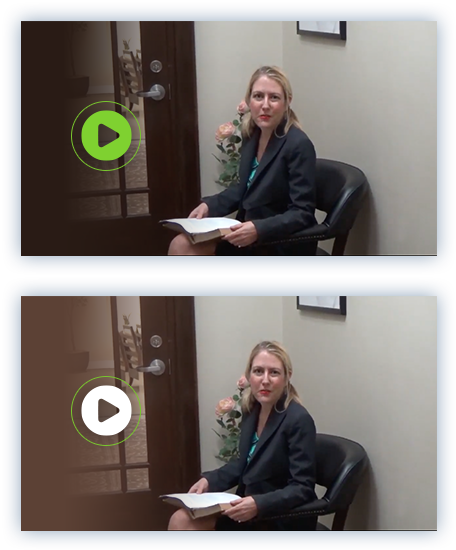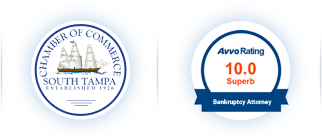Tampa Chapter 7 Bankruptcy Attorney
When a person experiences a serious debt problem, it can create a lot of anxiety and stress for himself and his family. Oftentimes the stress extends as well to their family and workplace. Sometimes it can seem like there is no solution and no way out. Creditors can be relentless. However, the United States Bankruptcy Code allows individuals to file for bankruptcy relief in order to stop creditor harassment, lawsuits, and garnishments, as well as provide a long-term solution to overwhelming debt problems.
A “fresh start” through Chapter 7 bankruptcy is a time-honored legal procedure dating back to the ancient world. The word “bankruptcy” means literally “broken bench.” In ancient Rome, if a merchant was deemed insolvent, he would go out of business by having his bench broken. The modern day equivalent is a “going out of business” sign on a storefront.

Legal debt relief was deemed so important to the Founding Fathers that bankruptcy courts are one of the very few federal powers specifically enumerated in the Constitution. Each day, hundreds of people throughout the country seek Chapter 7 discharges from debts such as credit cards, medical bills, and business problems. Many people who file for bankruptcy were simply “dealt a bad hand” in that something external happened to them, causing their financial hardship. Recent examples would include COVID-19, Hurricane Irma, and red tide.
The majority of bankruptcy cases are filed under three primary chapters of the Bankruptcy Code – Chapter 7, Chapter 11, and Chapter 13. Each of these has its specific requirements and advantages. Contact our experienced Tampa chapter 7 bankruptcy attorney today, we can help.
Chapter 7 – Liquidation Bankruptcy
Chapter 7 bankruptcy is also called a liquidation bankruptcy or straight bankruptcy. A Chapter 7 bankruptcy may be used by an individual, partnership, corporation, or other business entity that is unable to pay debts.
One of the primary advantages of a Chapter 7 bankruptcy is that it provides individuals a “fresh start.” In a Chapter 7 case, the bankruptcy court issues an order that discharges (or releases) the individual (who is called a debtor) from personal liability for most types of debt. The Chapter 7 discharge also creates a legal protection that prevents creditors from taking any further collections actions or filing any lawsuits to collect on the discharged debts.
However, the Chapter 7 bankruptcy discharge will not extinguish any valid liens on property.
Unlike other bankruptcy options, a Chapter 7 bankruptcy does not involve a repayment plan. That is because there is no repayment requirement in a Chapter 7 bankruptcy. Instead, the debtor is allowed to keep certain property (which is called “exempt” property) and a bankruptcy trustee then sells the debtor’s remaining assets, if there are any. However, because of the generous exemptions allowed in Florida, most individuals who qualify for Chapter 7 bankruptcy relief do not have to give up any property.
In Florida, the property that a debtor may keep is quite extensive and includes exemptions for items such as:
Homestead
- a homestead is exempt with no limit on value as long as the property is not larger than one half-acre if it is in an urban area or not larger than 160 acres if it is outside of a municipality.
Personal Property
- personal property (such as furniture, household goods, electronics) up to $1,000 (but raises to $4,000 if no homestead exemption is claimed)
- prepaid educational savings accounts (529 accounts), health savings accounts (HSA accounts), prepaid funeral costs, prepaid hurricane savings accounts
- alimony and child support
Wages
- the wages of the head of the family are exempt up to $750/week. Wages earned by others in the family are protected to some degree under the Consumer Credit Protection Act.
Pensions
- pensions such as ERISA qualified retirement plans and pensions (including 401(k) and 43(b) plans, IRAs, Roth IRAs, and others)
- pensions paid under Florida law to state and county workers, firefighters, municipal police, and teachers, and others
Public Benefits
- benefits paid under social security, unemployment, public assistance, workers’ compensation benefits, veterans’ benefits, and fraternal benefit societies, and others.
Insurance Proceeds
- these can include disability benefits, death benefits payable to a specific beneficiary, life insurance cash surrender value, annuity contract payments (but not lottery winnings proceeds).
Personal Injury Award Benefits
- awards for damages to employees who incur injury or death in hazardous occupations
Motor Vehicles
- $1,000 of vehicles (more if filing with a spouse)
Other
- Other exemptions may be available depending on the debtor’s situation and should be discussed with an experienced Tampa bankruptcy lawyer.
Filing For Chapter 7 Bankruptcy
Because Congress intended for Chapter 7 bankruptcy to be for those who have significant debt problems, a means test is conducted in order to determine whether an individual qualifies to file for bankruptcy relief under Chapter 7. The means test looks at monthly income, expenses, and debts in order to verify that the individual is not able to repay any of his or her debts. Bankruptcy laws generally also require that individuals receive approved individual or group credit counseling within 180 days before filing for bankruptcy relief.
Bankruptcy laws are constantly changing as new court decisions are released. Most of the changes have to do with the rights of creditors and debtors regarding certain types of debts and assets.
The knowledgeable and experienced bankruptcy attorneys at Samantha L. Dammer can help you with all bankruptcy-related requirements so that you can get your fresh start. Call us today at 813-221-3759 to get your bankruptcy-related questions answered. We are here to help.
A Personal Letter from Samantha L. Dammer.Esq
Dear Valued Client:
Most of our Chapter 7 clients are first-time filers, and they are understandably nervous about the bankruptcy process. While the internet is full of helpful, and sometimes even accurate, information on bankruptcy, it is no substitute for a consultation with a real attorney.
The easiest way to move forward is for us to schedule a time to discuss your individual situation. There is no fee for the initial consultation, and we can work around your schedule or even handle it over the telephone.
Most individuals with primarily consumer debts will need to meet the “means test” in order to qualify under Chapter 7. This means that your gross income must fall below the median income level for your state. As a general rule, a single person in Florida will qualify for a Chapter 7 individual bankruptcy if his gross annual income is less than $50,000. However, this amount can change greatly based upon whether you are married or if you have children or other dependents in your household. The qualification process can also be based upon your type of debt and whether you have any extraordinary expenses such as child support, educational expenses or medical bills. Certain types of income do not count toward the means test, such as disability and social security. Finally, it’s also different for disabled veterans.
So you can see that the qualification process can vary. Assuming that you can file a Chapter 7, our process is simple. We send you a questionnaire and you complete it, listing all of your assets and creditors and some other information. You must be very careful to list all of your creditors and to provide accurate addresses for each one; otherwise, they might not get included properly and you may still owe the debt. The questionnaire also asks for income and expense information, and other important questions. Keep in mind that all of the information requested from you is necessary for the preparation of your bankruptcy petition. While the questionnaire itself is confidential, we do use it to complete your paperwork. If you are not sure about how to answer a question, this is a good time to ask us for advice.
You also have to take a Credit Counseling class online. Most people will complete this in about an hour It is not a big deal, but it is required in order to file the case. There are actually two classes: one prior to filing, and one that’s taken afterwards. The cost varies but is around $10-15 for each class.
Once we get everything back from you, we prepare the petition and other paperwork, and then you come in and sign it. I will go over it with you carefully to ensure that there are no “surprises.” Then, we file the case. We go to court with you about four weeks later, and the trustee will ask you questions under oath. Assuming no complications, your discharge and case closure will occur about two months later.
Here are some common issues that can come up which could complicate your case:
- If you have “non-exempt” assets, we may have to negotiate with the trustee for a “buy back;”
- Do you own a business? This could make your case more involved;
- Are you in foreclosure, or trying to modify your mortgage? Real estate issues can require more skill and experience on the part of the attorney;
- Do you owe money to a friend-turned-enemy? Is there someone out there who will come to court to mess up your bankruptcy?
- Have you transferred any assets recently, especially to family members or friends?
- Are you involved in a personal injury case, or other lawsuit?
- Do you have a court date coming up which requires your case to be filed very quickly?
- Are you hiding assets or lying about your income? If so, please don’t call me as I will not help you.
Short of all that, the Chapter 7 bankruptcy is a smooth and painless process for most people.
My standard fee for an individual “simple” chapter 7 bankruptcy is usually between $1,900-$2,500, and in addition there is a court filing fee of $335. We offer payment plans and convenient methods of payment. You can learn more about my experience by visiting my website www.tampalawadvocates.com.
Please let me know if you have any additional questions, or wish to schedule an appointment to discuss further.
One thing that makes us a little different from other bankruptcy attorneys in Tampa is that we are not a “bankruptcy mill.” What that means is that although a large portion of my practice is bankruptcy, it is also important to me that each client receives personal advice and alternate legal options to filing a bankruptcy. We really take a holistic approach to your situation so that we can make sure that we are offering the best long-term, as well as short-term, legal relief.
I look forward to hearing from you. Thank you again for reaching out to us.
Sincerely,
Samantha L. Dammer, Esq.


